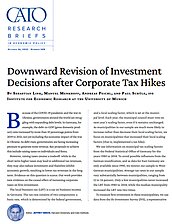Because of the COVID-19 pandemic and the war in Ukraine, governments around the world are struggling with expanding debt levels. In Germany, for example, the debt-to-GDP (gross domestic product) ratio increased by more than 10 percentage points from 2019 to 2021, not yet including the economic impact of the war in Ukraine. As debt rises, governments are facing increasing pressure to generate more revenue. Key proposals to achieve this include raising taxes on individuals and firms.
However, raising taxes creates a tradeoff: while in the short term higher taxes may lead to additional tax revenues, they may also reduce investment and therefore inhibit economic growth, resulting in lower tax revenues in the long term. Evidence on this question is scarce. Our work provides new evidence on the causal effect of increasing corporate taxes on firm investment.
The local business tax (LBT) is a tax on business income in Germany. The tax rate consists of two components: a basic rate, which is determined by the federal government, and a local scaling factor, which is set at the municipal level. Each year, the municipal council must vote on next year’s scaling factor, even if it remains unchanged. As municipalities in our sample are much more likely to increase rather than decrease their local scaling factor, we focus on municipalities that increased their local scaling factors (that is, implemented a tax hike).
We use information on municipal tax scaling factors from the Federal Statistical Office of Germany for the years 1980 to 2018. To avoid possible influences from the German reunification, and as data for East Germany are only available since 1990, we restrict our sample to West German municipalities. Average tax rates in our sample vary substantially between municipalities, ranging from 12 to 34 percent. Only a few municipalities never increased the LBT from 1980 to 2018, while the median municipality increased the LBT rate two times.
To measure firm investment in these municipalities, we use data from the ifo Investment Survey (IVS), a representative survey of incorporated firms in the German manufacturing sector. Since its inception in 1955, the survey has been conducted by the ifo Institute biannually in spring and fall. The data allow us to follow approximately 1,500 firms over time. Importantly, the IVS not only elicits actual levels of investment but also the planned volume of investment for the subsequent year. By comparing planned investments and actual investments each year, we observe whether firms invested more, less, or the same amount as previously planned. As municipalities announce LBT changes at the end of each year—that is, after the fall survey—firms’ investment plans do not include information about changes in the LBT.
Overall, we find a clear negative effect of increases in corporate tax rates on investment responses by the firms. That is, firms affected by a tax hike strongly revise their investment decisions within the same year. Our results suggest that a 1 percentage point increase in the LBT rate is associated with a decrease in the ratio of actual investment over planned investment by around 3 percent.
The structure of the IVS data allows us to analyze whether the effect of a tax change on corporate investment differs between periods of recession and normal times. We classify a year as recessionary if at least one-quarter of that year is defined as such by the German Council of Economic Experts. Municipalities are as likely to raise taxes in recessions as they are in normal times. However, while in normal times the share of firms that invest less than previously planned increases by 2 percentage points in years of a tax hike, this figure almost triples to between 5 and 7 percentage points during recessions.
The effect of tax increases on corporate investment is economically sizable. To illustrate the economic significance of the estimated effects, we conduct a back-of-the-envelope calculation. According to our estimates, €2.12 ($2.07) of firm investment is lost in the first year after a tax hike for each additional euro of tax revenues raised. In recession years, the investment decreases to €4.24 ($4.14) for each additional euro of tax revenue.
Our findings have direct policy implications, as they support the notion that taxes should not be increased during a recession. This has further implications for the optimal design of federal and local taxation: the current German system of local business taxation is inefficient, as the strong reliance on LBT revenues can force municipalities to increase taxes even in recessions, when this is especially harmful. Moreover, it does not make sense for municipal revenues to fall during recessions and increase during normal times. Tasks allocated to municipalities generally do not change between recessions and normal times, and some municipalities may even need higher spending during recessions because of responsibilities such as social assistance.
In terms of forgone investments, it would be especially costly if corporate tax rates were increased to stabilize revenues in economically turbulent times such as the current crisis. The results do not directly speak in favor of corporate tax decreases to stimulate investment, as our estimates are based on increases in the corporate tax rate. Prior studies have shown that rather than changes in corporate tax rates, more-targeted tax policies are more promising when it comes to stimulating investment. Consequently, we recommend a combination of stable corporate tax rates with more-targeted tax policies to balance the tradeoff between revenues and economic growth.
NOTE
This research brief is based on Sebastian Link, Manuel Menkhoff, Andreas Peichl, and Paul Schüle, “Downward Revision of Investment Decisions after Corporate Tax Hikes,” CESifo Working Paper no. 9786, June 2022; and Sebastian Link, Manuel Menkhoff, Andreas Peichl, and Paul Schüle, “Corporate Taxes Reduce Investment: New Evidence from Germany,” EconPol Policy Brief no. 44, July 2022.

This work is licensed under a Creative Commons Attribution-NonCommercial-ShareAlike 4.0 International License.
